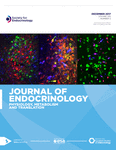A causal role for hyperinsulinemia in obesity
- N Templeman, Cellular and Physiological Sciences, University of British Columbia, Vancouver, Canada
- S Skovsø, Cellular and Physiological Sciences, University of British Columbia, Vancouver, Canada
- M Page, Cellular and Physiological Sciences, University of British Columbia, Vancouver, Canada
- G Lim, Cellular and Physiological Sciences, University of British Columbia, Vancouver, Canada
- J Johnson, Cellular and Physiological Sciences, University of British Columbia, Vancouver, Canada
- Correspondence: James Johnson, Email: james.d.johnson{at}ubc.ca
Abstract
Insulin modulates the biochemical pathways controlling lipid uptake, lipolysis and lipogenesis at multiple levels. Elevated insulin levels are associated with obesity, and conversely, dietary and pharmacological manipulations that reduce insulin have occasionally been reported to cause weight loss. However, the causal role of insulin hypersecretion in the development of mammalian obesity remained controversial in the absence of direct loss-of-function experiments. Here, we discuss theoretical considerations around the causal role of excess insulin and obesity, as well as recent studies employing mice that are genetically incapable of the rapid and sustained hyperinsulinemia that normally accompanies a high fat diet. We also discuss new evidence demonstrating that modest reductions in circulating insulin prevent weight gain, with sustained effects that can persist after insulin levels normalize. Importantly, evidence from long-term studies reveals that a modest reduction in circulating insulin is not associated with impaired glucose homeostasis, meaning that body weight and lipid homeostasis are actually more sensitive to small changes in circulating insulin than glucose homeostasis in these models. Collectively, the evidence from new studies on genetic loss-of-function models forces a re-evaluation of current paradigms related to obesity, insulin resistance and diabetes. The potential for translation of these findings to humans is briefly discussed.
- Received 10 September 2016
- Received in final form 16 December 2016
- Accepted 3 January 2017
- Accepted Preprint first posted online on 4 January 2017











